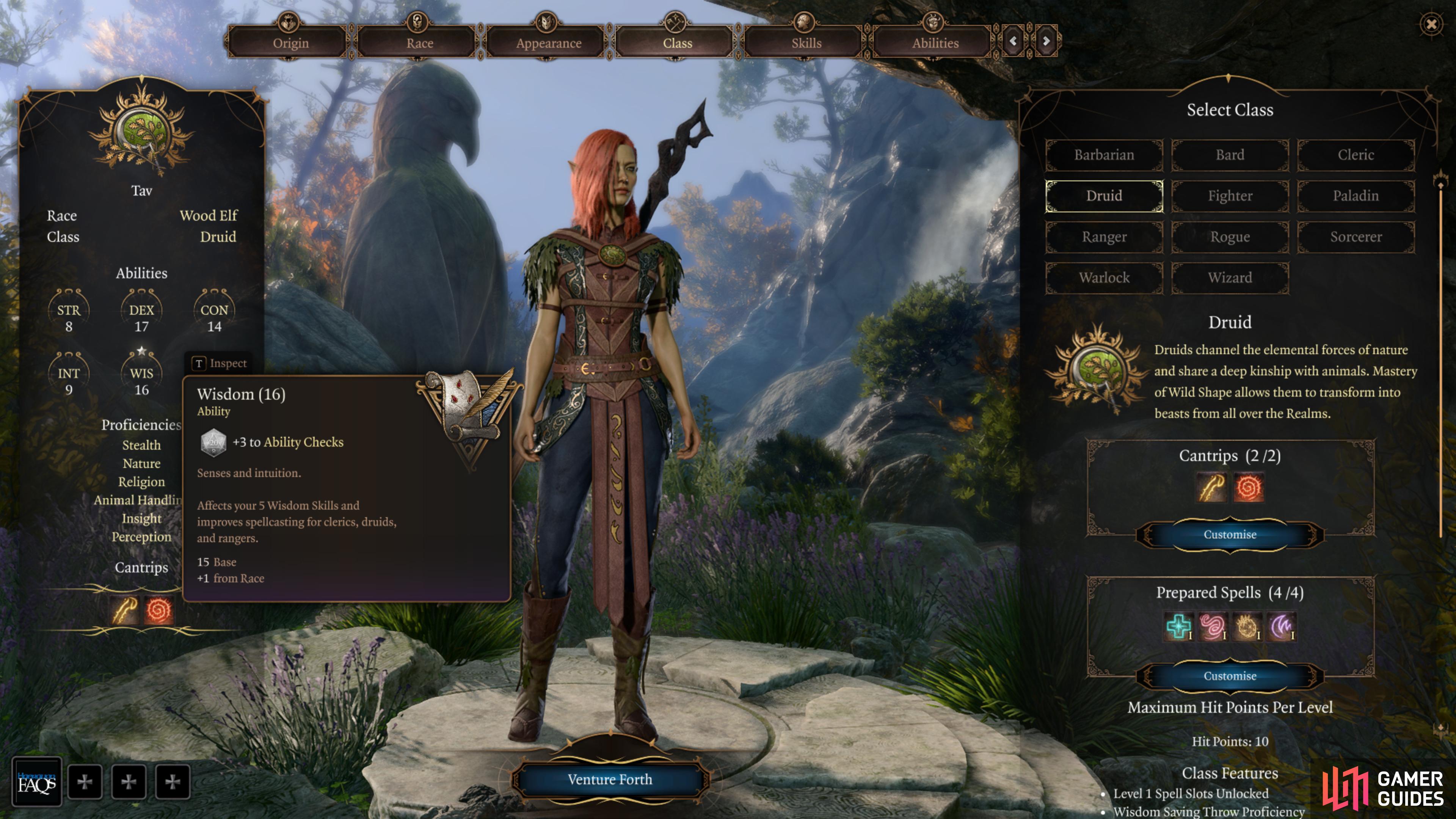Wisdom is one of the six Ability Scores that define a character’s physical and mental attributes. In Dungeons and Dragons, Ability Scores for player character races generally range from 3-18 - the result of rolling 3d6. In Baldur’s Gate 3, your player character’s starting Ability Scores will range from 8-15 by default, with racial modifiers potentially boosting them up to 17. On their own, Ability Scores don’t directly influence anything, but the higher an Ability Score is, the higher its associated modifier will be, and different Ability Score modifiers cumulatively affect just about every aspect of the game, including Attack Rolls, Damage Rolls, Skill Checks, Saving Throws, spell potency, and many, many more core aspects of the game. This page will explain what the Wisdom Ability Score does in Baldur’s Gate 3.
Clerics and Druids derive their spellcasting ability from Wisdom, making it a key Ability Score for those classes. Wisdom also boosts the Animal Handling, Insight, Medicine, Perception and Survival skills.
What Does Wisdom Do In Baldur’s Gate 3¶
Senses and intuition.
Affects your 5 Wisdom Skills and improves spellcasting for Clerics, Druids and Rangers.
-
Skills: You add (or subtract) your Wisdom modifier to a wide variety of skills, including Animal Handling, Insight, Medicine, Perception and Survival.
-
Saving Throws: You add your Wisdom modifier to Wisdom Saving Throws.
-
Cleric/Druid Spellcasting: Just as Wizards use Intelligence as their primary spellcasting Ability Score and Sorcerers use Charisma, Clerics and Druids use Wisdom. This makes Clerics and Druids by far the biggest beneficiaries of Wisdom, as their Wisdom modifier affects their spellcasting in three ways: First, the Saving Throws their spells impose is equal to 8 + Proficiency + Wisdom modifier - the higher a spell’s Saving Throw, the less likely enemies are to resist, mitigate or otherwise avoid the effects of your spells. Second, your Attack Rolls with spells are boosted by your Wisdom modifier (10 + Proficiency + Wisdom modifier), so any spells that have an Attack Roll will be more likely to hit. Finally, the number of spells you can have prepared at any given time is equal to your character level plus your Wisdom modifier - the higher your Wisdom, the more spells you’ll have access to.
Wisdom has long been in contention with Charisma for the status as most-favored dump stat in Baldur’s Gate games, with only a benefit to Saving Throws offered by Wisdom giving Charisma the edge (not to mention a Ring of Human Influence in *Baldur’s Gate 2 that made Charisma all but redundant). Of course, if you played a Cleric or Druid, you probably have a more favorable view of Wisdom, and that hasn’t changed much over the years.
Clerics and Druids add their Wisdom modifier to the Saving Throws on spells as well as to the Attack Rolls made with the spells they cast, generally making your spells more effective. While you no longer gain bonus spells based on your Wisdom score, your Wisdom modifier does directly affect how many different spells you can have prepared at a time. Unlike Wizards, Clerics and Druids know every spell available to them automatically, they merely have to choose a number of these known spells to prepare, and they can prepare a number of spells equal to their character level plus their Wisdom modifier. That being the case, a Cleric or Druid’s Wisdom modifier directly influences how versatile their spell arsenal is.
| Wisdom Score | Wisdom Modifier |
|---|---|
| 1 | -5 |
| 2-3 | -4 |
| 4-5 | -3 |
| 6-7 | -2 |
| 8-9 | -1 |
| 10-11 | 0 |
| 12-13 | +1 |
| 14-15 | +2 |
| 16-17 | +3 |
| 18-19 | +4 |
| 20-21 | +5 |
| 22-23 | +6 |
| 24-25 | +7 |
| 26-27 | +8 |
| 28-29 | +9 |
| 30 | +10 |


 Sign up
Sign up
No Comments